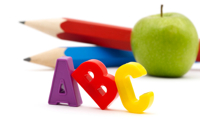 Preparing for the first day of school will make the transition a bit easier. My boys’ former preschool, Child’s Play, had great suggestions for helping kids get ready. We found more useful advice at PBS parents and Parents.com. Whether your kids are starting preschool or kindergarten or transitioning to a new grade or new school, these tips may be helpful.
Preparing for the first day of school will make the transition a bit easier. My boys’ former preschool, Child’s Play, had great suggestions for helping kids get ready. We found more useful advice at PBS parents and Parents.com. Whether your kids are starting preschool or kindergarten or transitioning to a new grade or new school, these tips may be helpful.
Practice going to school.
Get familiar with the route and the routine before the first day of school. Point out fun landmarks along the way.
Get them used to separation.
If your kids are not accustomed to being apart from you, it’s wise to begin the process. A few weeks before school starts, have grandparents or a babysitter watch your child for several hours. Arrange drop-off playdates for your child. The critical point is demonstrating that you’ll come back for them at the appointed time and place.
Meet kids in the class.
Find out the names of their classmates. Schedule playdates or see if the school or parents association has arranged any class gatherings before the first day.
Give children control over what they can control.
Let them make simple choices like picking the color of their backpack or their outfit on the first day of school.
Teach them the basics.
Help your child learn their name, address and phone number.
Give them a reminder of home.
Hang a family photo of your family from your child’s backpack or place one inside. Or let them stash a special keepsake inside their bag.
Describe what will happen on the first day.
Sometimes it is hard for children to imagine what it will be like at a new school or in a new grade. Talk to them about the sequence of events in their day so they can form a mental picture in their head and ease their tension.
Read books about starting school.
Check our booklist on Wednesday.
Ask your child specific questions, such as:
“What do you think the hardest part of school is going to be?”
“Is there anything that worries you about starting school?”
“What are you really looking forward to?”
Beware of what you promise.
Try not to make promises about things you cannot control.
For example: “You will love your teacher and make lots of new friends.” Although we wish this for our children, we do not want to set them up for disappointment.
Start going to bed earlier.
One or two weeks before school begins, start to emulate your school routine — which may mean going to sleep earlier or waking up earlier.
Learn about the drop-off policy.
Find out if the school allows/encourages parents to walk into their child’s classroom and how long they can stay. If you anticipate that your child will need extra time to adjust, talk to the teacher before school starts, if you can.
Create a first-day-of-school tradition.
Make a special breakfast, take a photo of your child ready for school in front of the house, or plan a special snack when they come home.
Plan ahead how you will say goodbye.
What does your child need? What will be most helpful for you and them to make the transition – a quick hug or five minutes of cuddle time?
Find more great health and safety tips from the American Academy of Pediatrics (AAP).








